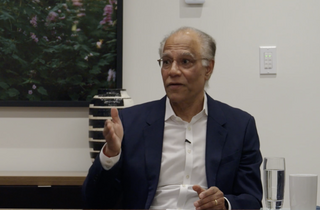
LP Expert Series
Turning Challenges into Opportunities with Shyam Gidumal
March 24, 2025

This video is part of our 'Unlimited' series, which features insights from our LP network made up of over 700 strategic individual investors who have helped build and scale some of the world’s most successful companies. Unlimited brings their expertise to life, highlighting lessons from industry veterans who have put growth into action across a variety of industries.

In this video, we sit down with Shyam Gidumal, a Lead Edge investor and seasoned expert in business transformation, who most recently guided WeWork through a challenging period to a successful IPO as President and COO.
Shyam shares his insights on turning challenges into opportunities, offering a strategic approach to navigating uncertainty and driving impactful turnarounds. We explore how leaders can cut through the noise to focus on what truly moves the needle, the key indicators of trouble in a growth-stage company, and the importance of fostering a culture that balances performance with psychological safety.
Shyam also outlines the core principles behind building high-performing teams, the value of empirical decisiveness in leadership, and the critical role of staying connected to customers. Whether you’re facing a major business challenge or looking to refine your leadership approach, this conversation provides actionable strategies to help you stay composed, make data-driven decisions, and uncover growth opportunities in any environment.
PART ONE: How to Cut Through the Chaos and Focus on What Matters
- Much of the perceived chaos in business is just noise—leaders must identify what truly moves the needle.
- Clarity leads to speed—without it, teams can be frenetic but not necessarily productive.
“If you are clear, then you can be really fast. If you're not clear, then you can be frenetic, but you're not necessarily actually making any progress.”
PART TWO: The Foundations of an Effective Team
- A clear and well-defined mission is the foundation of any successful team.
- Aligning organizational goals ensures that everyone is working toward the same objectives.
- Performance orientation must be reinforced with data-driven insights.
"One is to have a clear mission, sort of to get clear on what the mission really is. And I don't mean kind of high level, but really, what are we trying to do here?"
PART THREE: Red Flags That Signal Trouble in Growth Companies
- Weak unit economics that don’t align with financial models often indicate deeper problems.
- Competitors finding success in areas you’ve deemed unviable can be a sign of a flawed approach.
“In most cases, you can look and say that there were a lot of red flags that existed earlier. And the question is, did you notice?”
PART FOUR: Effectively Implementing Change
- Change creates uncertainty, and employees naturally resist unpredictability.
- Leaders must provide a sense of safety to encourage employees to embrace new ways of working.
- Consistency and repetition help teams adjust to new challenges.
"Your job as a leader in that moment is to provide them the path to be able to get to it and be able to do it consistently enough and be able to do it repetitively enough that they can do it well.”
PART FIVE: The Power of ‘Empirical Decisiveness’ in Leadership
- Great leaders are decisive but also data-driven, making decisions based on real insights.
- Focusing on measurable inputs and outcomes helps leaders judge whether they’re truly making progress.
- Avoid reverting to outdated strategies simply because they offer short-term comfort.
"You want people who are going to be decisive leaders, but that have an empirical nature to them, that they're looking at the actual information."
PART SIX: Advice to Founders: Staying Strong as You Scale
- As companies scale, leadership roles evolve—founders must focus on their most distinctive value.
- Trust the data—understanding where the business is succeeding (or not) is critical.
- Maintaining close relationships with key customers and prospects provides invaluable feedback.